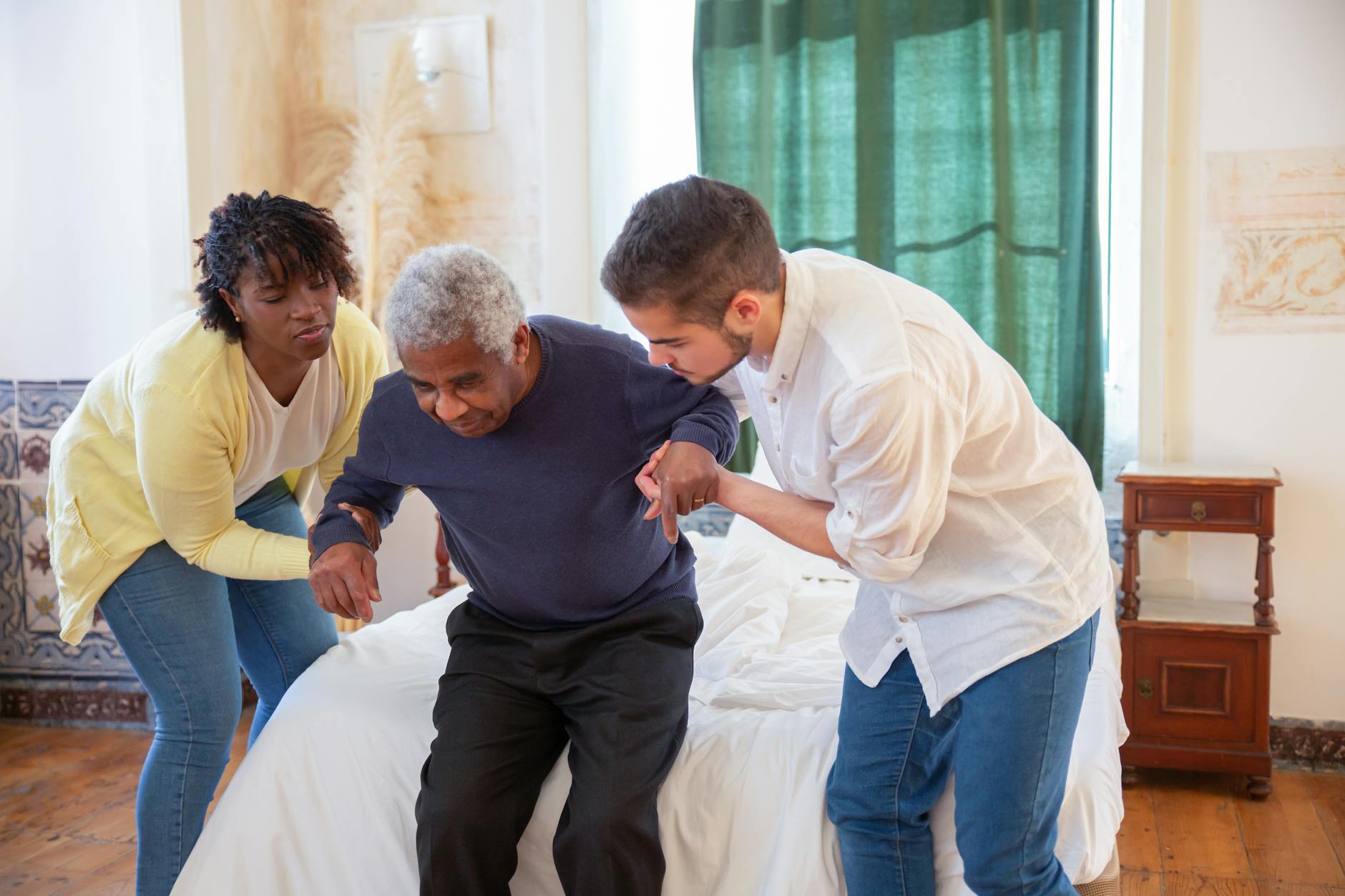The Mid-Adulthood Caregiving Picture – Why This Life Stage Is Critical for Elder Care

Mid-adulthood often marks the “care pivot point.” By ages 40–59, many adults step into the role of primary caregiver for one or both parents, sometimes suddenly due to illness, injury, or cognitive decline, and sometimes gradually as parents’ needs increase. This stage often overlaps with raising children, managing demanding careers, paying off mortgages, and preparing for personal retirement.
The South African Context
Older Population:
The population aged 60 and above is approximately 6.6 million, representing 10.5% of the total population.
Multigenerational Living:
Approximately 32% of South African households were multigenerational in 2022.
Rural Caregiving:
In rural areas, formal eldercare services are scarce, and reliance on family caregivers is the norm.
Global Parallels
- OECD Countries: Approximately 13% of adults aged 50 and over provide informal care, with about 8% doing so daily.
- Unpaid Care Work: Women perform an estimated 76% of all unpaid healthcare activities globally. The valuation of this work varies, with some estimates placing it at around 2.35% of global GDP.
Key Challenges to Mid-Adulthood Caregivers
- “Sandwich generation” pressures: managing children and parent care simultaneously.
- Emotional transitions: navigating role reversal (“parenting your parent”) while dealing with anticipatory grief.
- Economic strain: reduced career progression, lost income, and increased personal healthcare needs.
What “Holistic Care” for Aging Parents Really Means
Holistic care goes beyond feeding, bathing, and doctor visits. It integrates medical, emotional, social, environmental, and spiritual well-being—both for the parent and the caregiver.
Core Elements
Medical & Functional
- Chronic disease management (diabetes, hypertension, arthritis, heart disease).
- Mobility support & fall prevention (handrails, non-slip flooring, safe lighting).
- Medication reviews to prevent dangerous interactions.
- Early dementia & cognitive screening.
Mental & Emotional
- Addressing depression, anxiety, or grief in older adults.
- Supporting identity & purpose after retirement.
- Facilitating meaningful daily activities to maintain mental sharpness.
Social & Relational
- Maintaining dignity & autonomy by involving parents in decisions.
- Encouraging intergenerational bonding to reduce isolation.
- Protecting against ageism, which can erode self-worth.
Legal & Financial
- Understanding the Older Persons Act 13 of 2006 protections in SA.
- Accessing the Old-Age Grant (~R2,310–R2,330/month).
- Establishing wills, powers of attorney, and advanced healthcare directives.
Community Systems
- Leveraging NGOs, clinics, church networks, and Alzheimer’s SA support.
- Exploring respite care—even informal arrangements—to prevent caregiver burnout.
Home & Safety
- Adapting living spaces for accessibility.
- Regular safety audits for fall hazards, fire risks, and security.
Mental & Emotional Impact on Adult Children
Emotional load intensified by:
- Watching a parent’s health decline.
- Feeling guilty when unable to meet every need.
- Experiencing resentment from unequal caregiving distribution among siblings.
Mental Strain
- Research links caregiving to higher rates of depression, anxiety, and chronic stress, especially in women, who are more likely to take primary roles
Emotional Patterns in Mid-Life Caregivers:
- Role reversal grief: adjusting to being the decision-maker.
- Anticipatory grief: mourning the gradual loss of abilities/personality.
- Chronic worry: fear of falls, medical crises, or financial strain.
Protective Strategies:
- Peer support groups.
- Regular mental health check-ins.
- Skills training in dementia care, communication, and stress management.
Physical & Financial Impact on Adult Children
💸 Financial Toll:
- Reduced earning potential from fewer work hours or leaving employment.
- Increased household expenses (medical bills, home modifications, transport).
- Long-term impact on retirement savings & pension contributions.
💪 Physical Toll:
- Sleep disruption from night-time care.
- Back & joint strain from lifting/assisting mobility.
- Neglecting their own medical appointments.
South African Realities:
- Old-Age Grant provides some relief, but families often cover medicines, assistive devices, home modifications.
- Many employers lack formal eldercare leave policies; workers use personal leave/unpaid time off.

10 Ways TransformationWithin Supports Mid-Adults in Caring for Aging Parents
🌈 Caregiver Resilience Coaching – Strengthen mental & emotional resilience; prevent burnout.
📚 Science-Based Education on Elder Care – Online, research-backed sessions for confident decision-making.
🗣 Family Communication Strategies – Reduce conflict & build collaboration among siblings.
⏳ Time & Energy Management Tools – Create realistic care schedules & integrate personal time.
❤️ Emotional Health & Grief Support – Evidence-based strategies for anticipatory grief & guilt.
💵 Financial Clarity & Planning Guidance – Budget for medical costs, understand Old-Age Grant, secure finances
😴 Stress & Sleep Restoration Programs – Science-based sleep improvement & relaxation routines.
🤝 Community & Support Network Building – Access practical help and peer support.
🥗 Mid-Life Health Optimisation for Caregivers
Nutrition, movement, and preventive care guidance.
🚨 Crisis-Preparedness & Safety Planning
Step-by-step plans for medical emergencies & elder abuse risks
Social & Relational Impact on Adult Children
⚡ Relational Strain:
- Marital tension from reduced “couple time”.
- Sibling conflicts over care duties, finances, or decision-making.
- Strained parent-child relationships if boundaries aren’t respected.
👫 Social Changes:
- Less time for friends, hobbies, and community activities.
- Loss of spontaneity due to rigid care schedules.
🌟 Potential Positives:
- Stronger family bonds through shared purpose.
- Children witness compassion & respect for elders, passing on important values.
Impacts on Aging Parents
Physical Health:
- Proper holistic care slows decline & prevents hospitalisations.
- Neglect accelerates physical & cognitive deterioration.
Dignity & Autonomy:
- Exclusion from decisions triggers depression & resistance to care.
- Small daily choices preserve self-worth.
Cognitive Health:
- Dementia rates are rising in SA & globally.
- Early intervention (mental stimulation, exercise, diet) can delay progression.
Dementia-Informed Care in South Africa
Global Trend
- Over 55 million people worldwide are living with dementia, projected to rise to 78 million by 2030 and 139 million by 2050 (Alzheimer’s Disease International).
Family Role
- Families in South Africa often provide dementia care without formal training, which can lead to crises and caregiver strain (PMC Study).
Prevalence in South Africa
- Approximately 352,000 South Africans aged 60+ are living with dementia. Many cases are under-diagnosed, particularly in rural areas and lower socio-economic communities (Alzheimer’s South Africa).
Best Practices:
- Structured daily routines.
- Safe, clearly marked home environments.
- Training for behavioural changes.
- Early legal & financial planning.
Safety, Rights & Elder Abuse Protections
⚖️ Older Persons Act (SA):
- Criminalises physical, emotional, and financial abuse & neglect.
- Mandates reporting of suspected abuse.
- Supports community-based care programmes.
🚨 Elder Abuse Warning Signs:
- Unexplained bruises or injuries.
- Withdrawal from social interaction
- Missing money/unpaid bills despite income.
📝 Action Steps:
- Keep a trusted contact list.
- Educate family on abuse signs & reporting processes
South African Household Realities – Why Context Matters:
- The average household size is ~3.2 people; many households are multigenerational.
- Grandparents active in caregiving for grandchildren; support is reciprocal.
- Rural caregivers face longer travel times & fewer support services.
💡 Implication: Holistic care strategies must be adaptable to both resource-limited and urban settings.
Practical Guidance for Mid-Adult Caregivers
Assess & Map Care Load
List daily, weekly, and monthly tasks; identify which can be shared, outsourced, or automated.
Protect Your Health
Annual check-ups; schedule rest days/hours.
Build Financial Clarity
Track expenses; review insurance, grants, and legal documents yearly.
Plan for Cognitive Decline Early
Monitor memory/behaviour changes; involve parents in planning.
Keep Boundaries Clear
Set visiting/call hours; agree on sibling responsibilities.
Prevent Abuse & Neglect
Rotate duties; maintain parents’ social connections.
Leverage Community
Use NGOs, clinics, and church networks for support.
Our Programmes
Our coaches provide comprehensive interventional support for students through both group and individual program options.
Get In Touch
Reach out to learn more about how we can help, or if you have any questions or concerns
